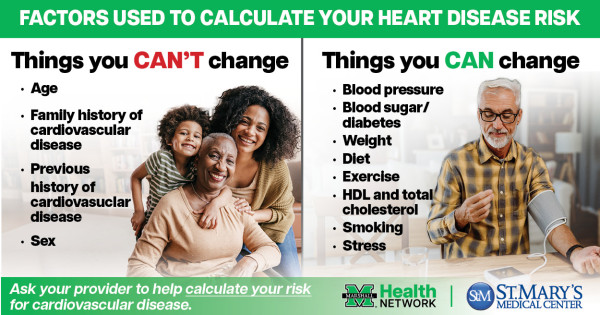Reduce Your Risk for Heart Disease

Although heart disease is preventable and controllable, it is the leading cause of death for both men and women. You can help prevent heart disease by identifying your risk factors:
- High blood pressure
- High blood cholesterol
- Tobacco use
- Physical inactivity
- Dietary factors
- Overweight/obesity
- Diabetes & pre-diabetes
- Metabolic syndrome
Other factors that contribute to heart disease include sleep apnea, stress, depression, anemia, the overuse of alcohol and, for women, using birth control pills after age 35.
Weighing Your Risk Factors
Because they work together, each risk factor is more potent. For example, because being overweight (a risk factor) may cause high blood pressure (another risk factor); you are many times more likely to develop heart disease. And if you have high blood pressure and high cholesterol, your risk skyrockets if you also smoke. With each unhealthy habit that you reduce or control, your risk of developing heart disease diminishes significantly.
Ask your provider to help calculate your risk for cardiovascular disease.
Lowering Your Risk & Improving Your Health
Become more heart-healthy by making smart choices and managing any risk factors you may have:
- Eat a healthy diet. Choose healthy meal and snack options to avoid heart disease and its complications. Adults should have at least five servings of fresh fruits and vegetables each day. Eat foods low in salt, saturated fat, trans fat and cholesterol, and high in fiber to improve your heart health.
- Maintain a healthy weight. Being overweight or obese can increase your risk for heart disease. To determine whether your weight is in a healthy range, you can calculate your body mass index (BMI) and the ratio for your waist and hip measurements to measure body fat.
- Exercise regularly. Physical activity can help you maintain a healthy weight and lower cholesterol and blood pressure. The Surgeon General recommends that adults should engage in moderate-intensity exercise for at least 30 minutes on most days of the week.
- Monitor your blood pressure. High blood pressure often has no symptoms, so be sure to have it checked on a regular basis. You can check your blood pressure at home, at a pharmacy or at your doctor's office. Be sure to discuss any concerns about your blood pressure with your doctor.
- Don't smoke. Cigarette smoking greatly increases your risk for heart disease. If you don't smoke, don't start. If you do smoke, quit as soon as possible. Your doctor can suggest ways to help you quit, or you can work with our tobacco cessation program for help in quitting.
- Limit alcohol use. Avoid drinking too much alcohol, which can increase your blood pressure. Men should stick to no more than two drinks per day, and women to no more than one. Talk to your doctor if you are having difficulty limiting your alcohol intake.
- Have your cholesterol checked. Your healthcare provider should test your cholesterol levels at least once every five years. Talk with your doctor about this simple blood test. If your cholesterol is high, you can take steps to control it.
- Manage your diabetes. If you have diabetes, monitor your blood sugar levels closely, and talk with your doctor about treatment options. In addition to preventing any long-term complications of diabetes, controlling your blood sugar will help your heart health.
- Take your medicine. If you're taking medication to treat high blood pressure, high cholesterol or diabetes, follow your doctor's instructions carefully. Do not skip any doses unless your doctor directs you to do so. Always ask questions if you don't understand something.
To learn more about your individual cardiac health, call to schedule vascular screenings and/or a cardiac CT scan. These self-pay screenings do not require a physician's referral.
Source: www.cdc.gov
